Through education and awareness you can significantly reduce your chances of becoming a victim. In most cases financial scams follow very similar patterns and early detection is possible if you know what warning signs to look out for.
The examples below represent a selection of mail, email and telephone scams. A brief explanation has been added, at the end of each, to help you identify the good from the bad.
- Send Your Money To Bargain Shoppers Express…
- IRS Tax Refund Is Now Available But Only If…
- Reputable Content But Who’s Website Is That…
- Please Sign-In To Your Account Periodically…
- You Must Login This Instant…
- I’m With eBay And Need Your Personal Information…
- Email Based Forms Are NEVER Secure…
- Sloppy Grammar Should Always Raise A Red Flag…
- Update Your Credit Card Details…
- Pass This Along To Everyone You Know…
- Text Messaging Scam Targets Bank Accounts…
- I Need Your Social Security Number…
- I’m Not Human But Need To Verify…
- I Work For The Credit Card Company…
- I’m A Bank & Need To Verify Your Bank Account…
- Your Loan Is Ready But We Lost Your Information…
- Our Records Show That You’re A Customer…
- Detective Thompson Needs Your Help…
Send Your Money To Bargain Shoppers Express…
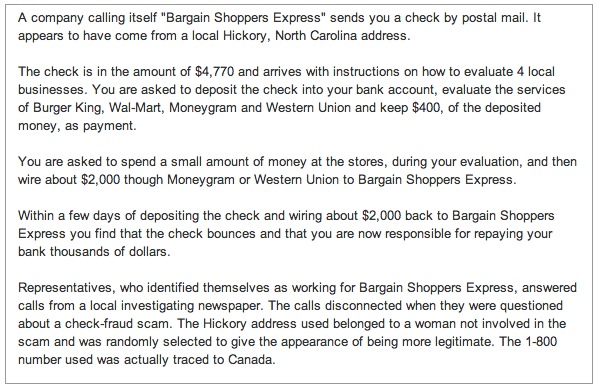
This is a fake-check mail scam. There is NO LEGITIMATE REASON why anyone would give you a check or money order and ASK YOU TO WIRE MONEY anywhere in return.
Mystery shopper, foreign business offers, love losses, overpayments, rental schemes, sudden riches and work-at-home opportunities are all possible scam scenarios but the basics are that they all ask you to send them money and will often include a fake check in the mail as a way to get you excited. They often ask you wire money via Moneygram or Western Union as this method is fast, international and offers minimal regulation and identity checks to complete a transfer.
IRS Tax Refund Is Now Available But Only If…
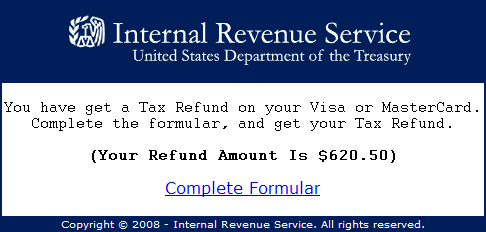
This is a Phishing email scam. The Internal Revenue Service (IRS) DOES NOT issue Tax Refunds via credit cards. All Tax Refunds will come to you in the form of a paper check or as a direct deposit to your bank account, depending on the method through which you previously opted to received Tax Refunds.
The above email scam aims to trick you into thinking that a refund payment has arrived and that all you need to do is provide them with a few of your highly personal and very sensitive details, including your credit card number, social security number etc.
Note several red-flags which might help you identify a potential scam before it strikes.
- Spelling errors are present in what is supposedly from a government agency.
- The communication consists of very little if any actual text. A common spam/scam trick.
- The communication asks for highly sensitive personal information.
- The communication offers a link or telephone number which is unfamiliar.
A legitimate bank or securities company, including the IRS, will NEVER contact you via Email / Telephone asking for sensitive personal information or account numbers. A legitimate company or government agency already has this information so does not need to ask.
Never provide sensitive personal data or account numbers via standard email or an email based form. If you need to provide personal data via a website based form, make sure you go to the source website by typing the URL directly into the address bar. Never click on an email link provided, to get that site. Also, make sure you see https:// in the address bar to be sure that page is securely transmitting your personal data.
Reputable Content But Who’s Website Is That…
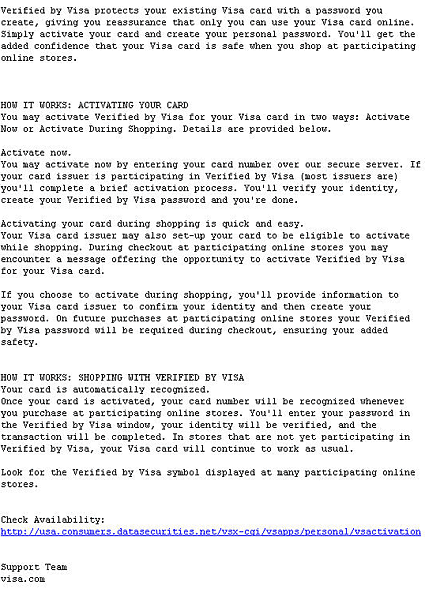
This is a Phishing scam. If you got this one wrong, don’t feel bad: It’s not technically sophisticated, but it doesn’t show too many telltale signs of the typical phishing scam. While most phishing scams try to scare you into entering your personal financial information, this one simply explains a new service and then adds a link to their own website at the bottom. In fact, the body of the email is copied straight from Visa’s website.
Please Sign-In To Your Account Periodically…
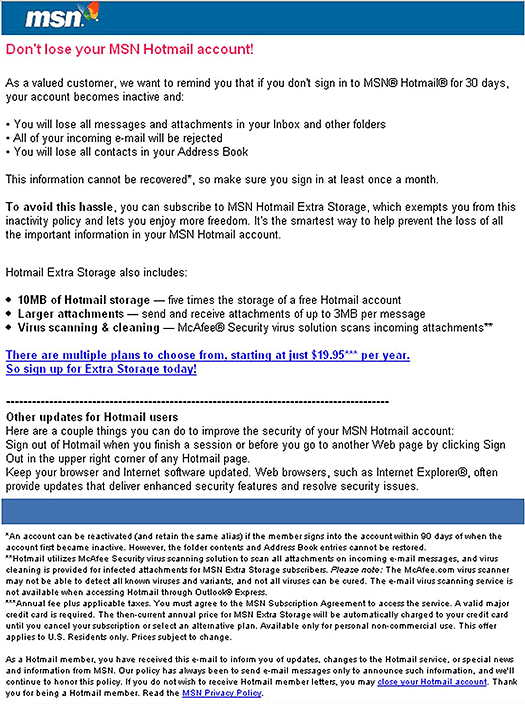
This is a legitimate email, from Hotmail sent to account holders to remind them to sign into their account periodically. Notice, however, that it does not try to get you to click on a link in the email.
You Must Login This Instant…
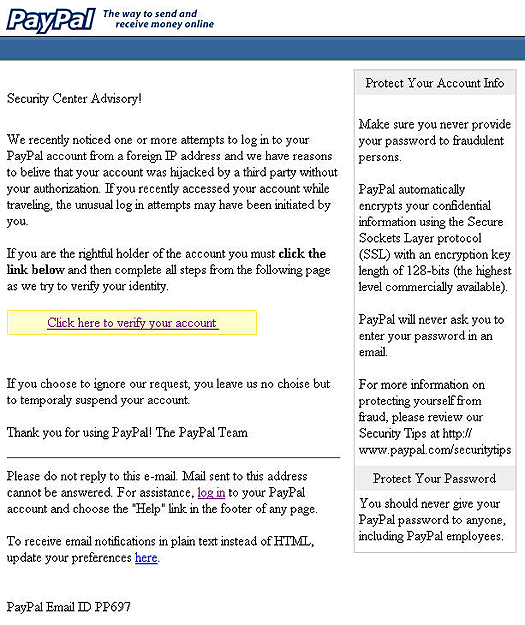
This is a Phishing scam. The giveaway on this phish is that it attempts to frighten you into giving up your most intimate financial details. Many phishing scams use this approach, claiming someone has hacked your account or that it will be suspended unless you “verify” your information.
I’m With eBay And Need Your Personal Information…

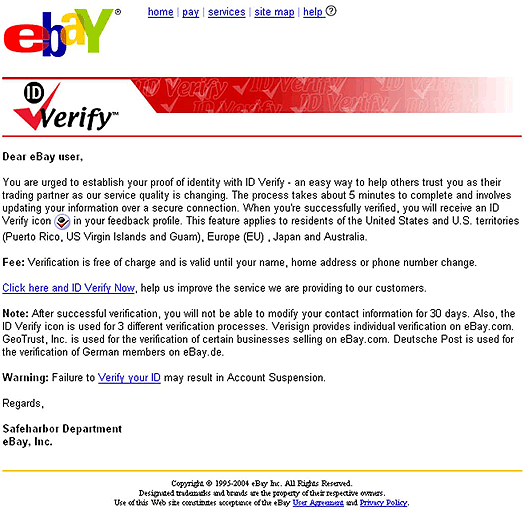
This is a Phishing scam. This is a bogus eBay email that tries to take advantage of eBay’s very real ID Verify program. Notice the scammers try to scare you into responding immediately and giving up your personal information. It also asks you to click on a specific link within the email.
Email Based Forms Are NEVER Secure…
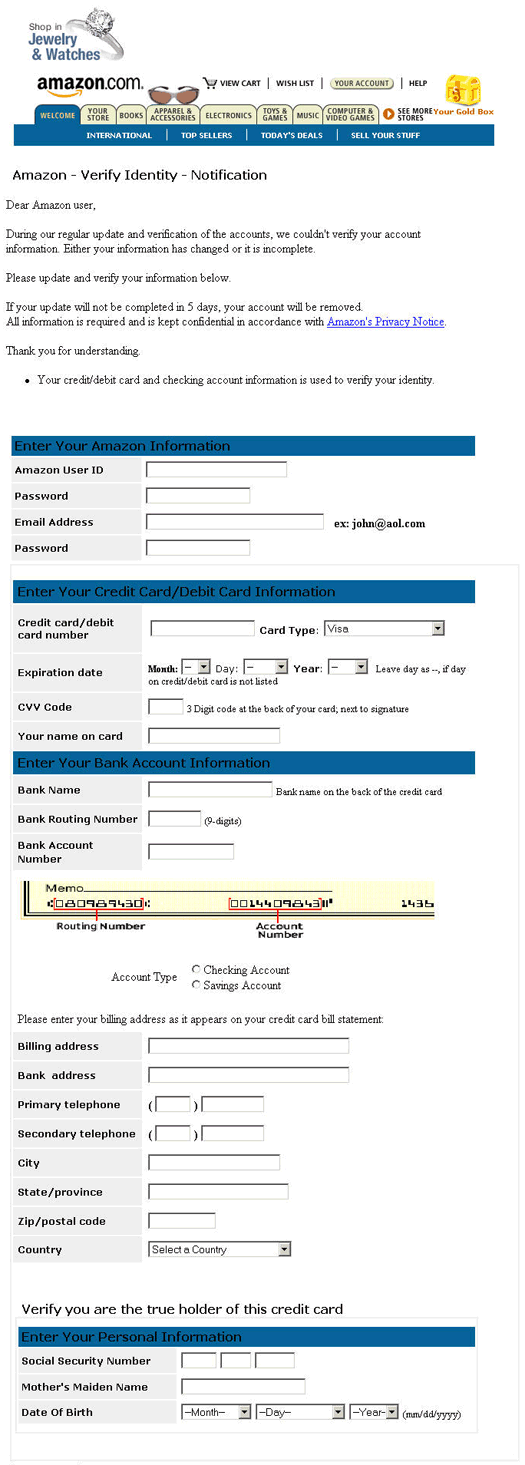
This is a Phishing scam. The big tell on this phishing scam is that it is asking you to enter your financial details in an email. E-commerce companies should never ask you to do this as email is not a secure way to transmit sensitive information. If you are unsure whether an email you receive is legitimate, call the company in question or visit their website by typing the address of the company directly into your Internet browser. It’s a good idea never to click on links in an email you’re not expecting, as it’s most likely spam and every click is probably being tracked. They’ll send you more spam email.
Sloppy Grammar Should Always Raise A Red Flag…
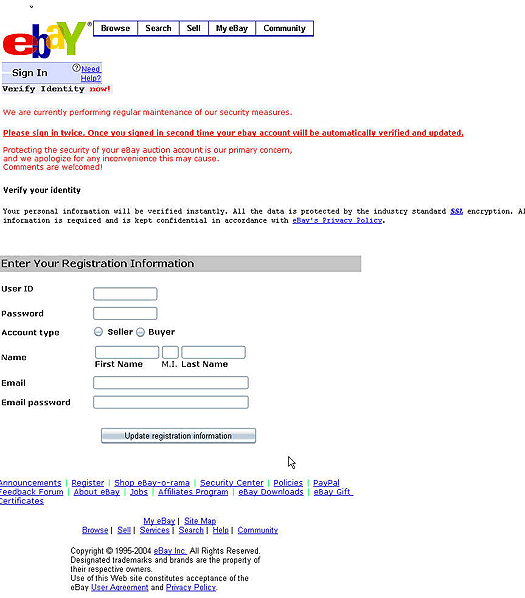
This is a Phishing scam. This one certainly has all the right graphics for eBay, but closer inspection reveals some sloppiness in grammar. But the major red flag here is eBay and most banks will never ask you to send sensitive financial details via an email. Email is not a secure communication medium, where sensitive information is concerned. It would be irresponsible for any legitimate company to use it as such.
Update Your Credit Card Details…
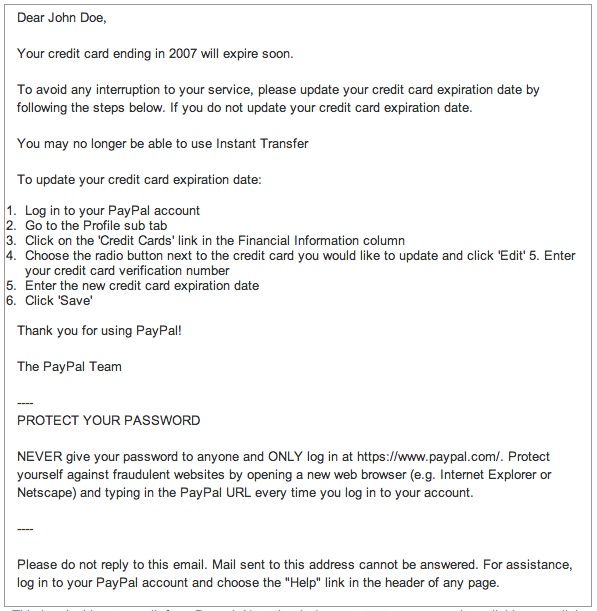
This is a legitimate email, from Paypal. Note that it does not try to scare you into clicking on a link or visiting a website to enter your personal information. It also addresses the sender by their name, though that name has been blocked out for the purposes of this example.
Pass This Along To Everyone You Know…

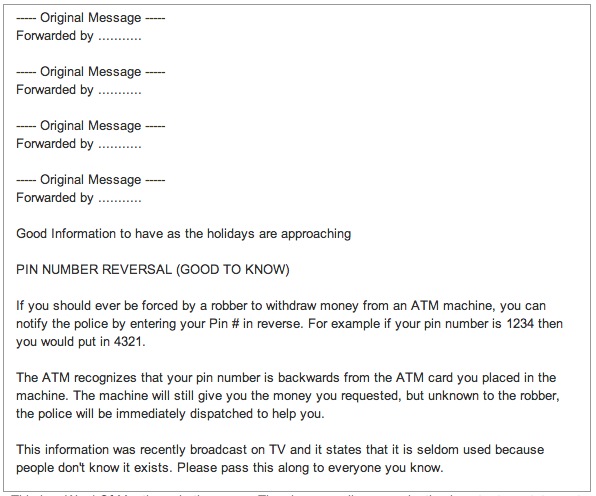
This is a Word Of Mouth marketing scam. The above email communication is not a true statement and only serves to spread confusion. ATM’s will only accept a valid PIN number and will not contact the police in the event that you reverse your PIN number.
Text Messaging Scam Targets Bank Accounts…
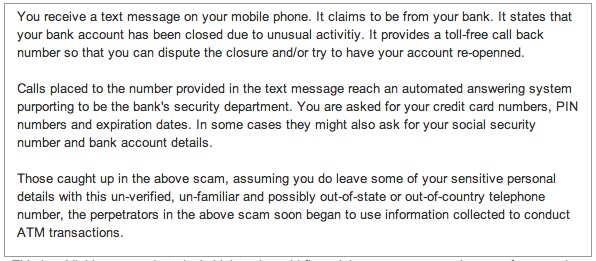
This is a Vishing scam. In today’s high-tech world financial scams can come in many forms and via many different communication mediums. This scam targets mobile phone users by sending a text message in hopes that you will respond or react favorably to their message and use the unfamiliar telephone number they conveniently provide to call them back and give them all your sensitive personal information.
Note: that in almost all cases the call back number is actually an answering machine and the message almost always generic and non-branded. So it really could be from anyone. These are some of the red flag warning signs you should always be on the look out for. Regardless of what text messages you receive or how you receive a communication, if (1) they contacted you and (2) they are asking for your highly sensitive personal details, then this is a big warning sign and it doesn’t matter how much they try to convince or push you otherwise. If they really, really, simply must have your personal information then this is just another red flag warning sign to add to your list.
Your best bet is to take the communication as an alert that something “fishy” might be going on. That you might need to call your bank or local company to make sure everything is ok but that you will do this ONLY via your own verified contact information, for which you know to be valid and true.
I Need Your Social Security Number…
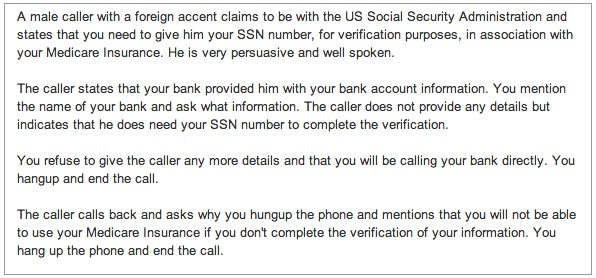

This is a Vishing scam. There are several red flags here which can help you identify a potential scam. (1) He speaks with a foreign accept but claims to work for a US government agency. (2) The caller is asking for very sensitive personal information and needs this information right now. (3) The caller has an excuse for why it’s not possible for you to just hangup and call the Social Security Administration directly yourself using a telephone number you know to be a valid and true agency number. (4) The caller claims to have already called your bank and been given your bank account information but can’t provide any evidence or details to back up their claim.
On the flip side you did well to not give up too much information. You didn’t need to mention your bank name as the caller still hadn’t proved who they were. If they call you and especially if you can’t verify a caller ID because they have blocked it, then they really could be calling from anywhere and claim to be with any number of government or official sounding agencies.
Your best line of defense is to not give out ANY information to ANY caller until you are 100% sure of who you are actually talking to. The best way to be 100% sure of who you are actually talking to is to just say “thank you for the information but I will call my bank or local agency myself”. Call your bank or local agency directly using a verified and trusted telephone number, not a number that the caller gives you for the purpose of calling them back. If anyone calls you and asks for ANY sensitive personal information, that is an automatic red flag regardless of who they claim to be.
A legitimate bank or securities company will NEVER give out details about either your account or personal information without your prior consent! If we receive a call asking for information, we will always contact you first!
I’m Not Human But Need To Verify…

This is a Vishing scam. They called you so you really can’t confirm where the call actually came from, regardless of what it says on your telephone screen. The caller is an automated system which raises questions as to whether someone is trying to hide their true identity. The caller wants you to call a non-local branded 1-800 telephone number that is unfamiliar to you. When calling this unfamiliar, non-local branded number they ask for very sensitive personal information and they want all the details not just the last 4 digits of your credit card.
Under NO circumstances would any legitimate bank or securities company ever need you to disclose all your sensitive personal information over the phone or via email. Under NO circumstances should you ever give out your credit cards PIN number to anyone, even to your bank. The only way your information can fall into the wrong hands is if you give them that information. You always have the power to just say NO and that YOU will contact your local bank using a telephone number which you are familiar with and know to be valid. Otherwise you might as well be calling China.
I Work For The Credit Card Company…
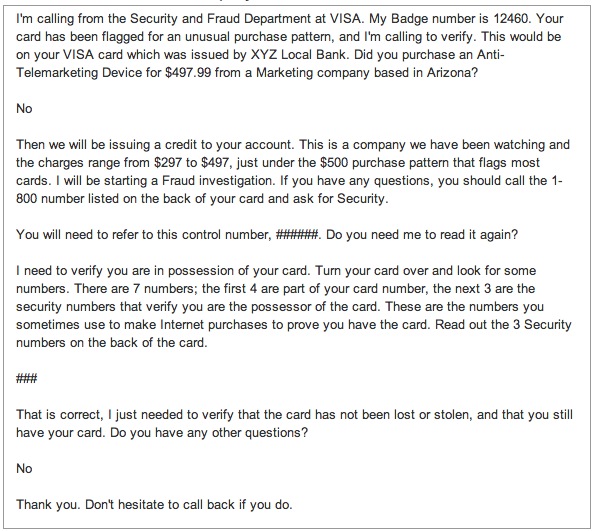

This is a Vishing scam. You actually said very little and they never asked for the card number itself. This was because they already had the card number and only needed the 3 digit security code on the back of your card to be able to process transactions at will.
Both VISA® & MasterCard® stress that they will NEVER ask for anything on your card as they already know this information since they issued the card!
These types of scams may even call you back the next day and enquire about charges placed on a different card. Always question whether they really need this information given who they claim to be. If ever unsure it’s always better to just hang-up and call your local bank or credit card company yourself, using a telephone number you personally do trust to be valid.
I’m A Bank & Need To Verify Your Bank Account…

This is a Vishing scam. Your bank would never ask you for sensitive information it should already have. If someone calls and asks for personal and very sensitive information just say thank you for the information, don’t give out any, and then call your bank yourself, using your own trusted number. Just because someone called you doesn’t mean they can’t wait 5 minutes while you call them back. Never give out more than the last 4 digits of a credit card number if someone is trying verify a card. A legitimate company doesn’t need all the details.
Your Loan Is Ready But We Lost Your Information…

This is a Vishing scam. Never give out sensitive personal information or account numbers over the phone, especially if you don’t personally know the person on the other end of the line.
Our Records Show That You’re A Customer…

This is a Vishing scam. Don’t give out sensitive personal information, in any shape or form, unless you know who you are giving it to. In this case just ask them to send you a bill. If you really are a past customer then they already have your information. If they lost your information except for your telephone number then this is their problem not yours. Do they really need your social security number?
Detective Thompson Needs Your Help…

This is a Vishing scam. The police would never call you asking for your bank account number. If in doubt call your local police department or bank, directly using your own trusted number. Does the caller really need this information given who they claim to be? Make sure the trusted number is your own not one the caller gives you.



